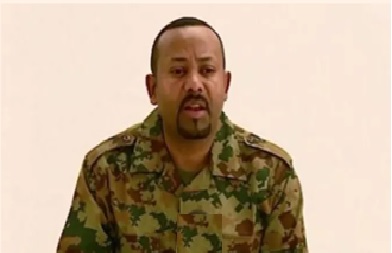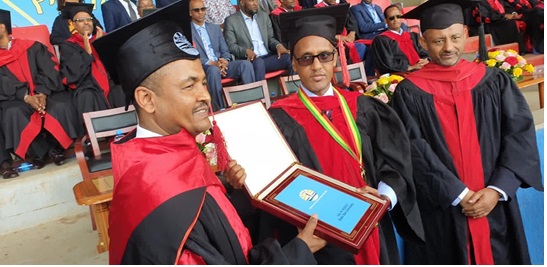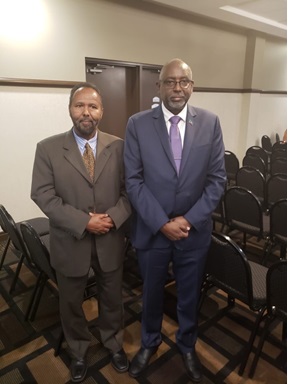Editor’s Note: Hassan Abdullahi Duale “Hassan Jabhad” is a Somali community activist, intellectual, and former freedom fighter in the national liberation movement in Western Somalia, now the Somali Regional State (SRS) of Ethiopia. A graduate of Gahayr University and an economist by training, Duale worked for the Central Bank of Somalia in the Economic Research Department. He is considered knowledgeable regarding the history and political activism of Somalis in Ethiopia. On July 19, 2019, while in Canada, Duale talked with Wardheernews contributor Hassan M. Abukar on the phone. For the purposes of brevity, the following is a condensed version of that lengthy interview.
———————
Wardheernews (WDN): Where is Ethiopia headed after recent and dizzying events like a recent attempted military coup and rising ethnic tensions?

Duale: Observers of Ethiopia are bewildered by the current situation in the country. It is the slow, painful unraveling of Africa’s second most populous country. In sum, we are experiencing a country on the brink of disintegration. Various ethnic groups are asserting themselves in order to grab more power. Others like Sidama people are calling for an independent region of their own. Worst of all, there have been five coup attempts in the country during the past year.
WDN: Is this the beginning of the end of Ethiopia as we know it?
Duale: The situation is dire, and Ethiopia is in the throes of becoming a failed state. The federal government is slowly losing control of the country because ethnic armed forces are clashing with the national army. Federal soldiers are showing signs of loyalty to their ethnic groups. The federal government has no access to the Amhara and Tigre regions. Economic growth has regressed, taxes are not collected in parts of the country, and corruption is rampant. The ruling party (EPDRF) remains divided. The United Arab Emirates gave the federal government about $3 billion for loans and investment last year to ease the country’s ongoing foreign currency shortage, while Addis Ababa still owes for loans to China. Almost three million Internally Displaced Persons (IDP) are scattered all over the country after fleeing from communal strife. And then there is the problem of armed citizens, a situation that is pregnant with violence. I am afraid the country is teetering toward civil war, a prospect that will have serious ramifications in Africa, the Middle East, and Europe.
WDN: What is the status of Prime Minister Abiy Ahmed’s vaunted leadership and reformist new government?
Duale: Too many empty promises but no vision. The political system in the country is too entrenched for Abiy to reform. We have only seen cosmetic changes under Abiy; a few new figures here and there. He did a few remarkable things; he has eased the regime’s iron grip, released political prisoners, stopped mass incarcerations, and reconciled with Eritrea.
WDN: How do you see Ethiopia’s future as a country?
Duale: I am deeply concerned that the future does not look bright for Ethiopia. The three pillars of modern Ethiopia (the Amhara, the Oromo, and the Tigre) have shown signs of faltering. First, the Amhara ruled modern Ethiopia, then the Tigre under the mask of the Tigray People’s Liberation Army (TPLF), and now the Oromos are in an unholy alliance with the Amhara. This alliance is now showing cracks. The Sidama people, as I mentioned previously, are trying to flex their muscle and get a share of the pie. The Somali regional leadership is at a crossroads.
WDN: How does the Somali Regional State fare in this ever-changing situation in Ethiopia?

Duale: Surprisingly not well. Mustafa Omer, the Somali regional leader, was installed in Addis Ababa almost a year ago and hence did not come by the will of Somalis. He lacks what I call “the Somali vision.” If the Amhara, the Oromo, and the Tigre have a clear vision of how they see Ethiopia and what they want, it’s not clear what President Omer wants. He is basically hobnobbing with the Amhara at times and with the Oromos at other times. He travels a lot like his predecessor Abdi Iley, lacks managerial skills, and uses patronage system to stay in power. He has recently fired about 200 civil servants (managers, directors, mayors, district chiefs and others) because they had skipped parts of a meeting he had called for. Unfortunately, he is impulsive in his dealings with people and decision-making, feckless, vindictive, and incapable of accepting criticism. He runs fake social media trolls to attack and defame his rivals. He has shown neither leadership skills nor empathy to address the issue of the 700,000 Somali displaced persons in the region, who were uprooted by the Oromo and recently by the Afar from Moyale to Tulliguled and Dire Dawa. In short, Omer is someone who has been imposed on the Somali people.
WDN: But in reality, Ethiopian regional leaders are not democratically elected by their people but instead are appointed by the Federal government. What is different of Omer’s selection?
Duale: I don’t see, for instance, the Amhara regional leader being selected in Addis Ababa. Each regional leader is selected in his/her respective region. Omer’s selection process was tainted.
WDN: Wasn’t the situation in Jigjga (the capital of the Somali region) dangerous at the time when Omer was chosen as a leader in Addis Ababa? Remnants of Abdi Iley’s security apparatus were still present in Jigjiga, right?
Duale: In fact, the SRS at the time was under national army occupation and Abdi Iley’s forces were disarmed. At any rate, legitimate Somali leaders did not choose Mustafa Omer. Moreover, there is still a federal occupation army in the Somali region.
WDN: Aren’t Somalis in the federal army?
Duale: Historically, Ethiopia has used an “outsider policy” toward Somalis; you are Ethiopian, but you cannot be part of the national army and the decision-making process of the country. Somali soldiers have been recruited in the national army, but the officer corps lacked Somali representation. Do you know that there is no single Somali colonel in the Ethiopian national army? Somalis have always been viewed as aliens, a group of nomads crossing borders from Somalia and Kenya. In reality, ordinary Somalis in Ethiopia do not consider themselves as citizens, only as an occupied people.

WDN: What is the role of the Ogaden National Liberation Front (ONLF) in the Somali region since it returned to the country and laid down arms?
Duale: The ONLF is doing a good job. The organization has signed a peace agreement with the Ethiopian federal government and, hence, mostly deals with Addis Ababa. It has taken positive steps since its return, such as trying to be inclusive and not be seen as a tribal group. It is explaining its goals and programs to all Somalis in the region and is gaining more members. The organization has never wavered from its mission of liberating Somalis from colonialism.
WDN: How do you see the future of Somalis in Ethiopia?
Duale: They have to be united as a group with united leadership—in essence, no tribalism. They have to develop what I call a “Somali strategy.” We have to understand that we are an occupied people and we have the right to self-determination. There should be a peaceful referendum in the SRS to determine our own destiny . The current state of the region with President Omer on the top being clueless is not helpful. There must be a Somali vision, a Somali strategy, if we want to go forward.
WDN: Thank you Mr. Duale for your time.
Duale: You are very welcome and thanks to you Hassan and WardheerNews for the opportunity, and the great work you have for the Somali people and those interested in the affairs of the greater horn of Africa.
——-
Related Interviews:
–An ONLF Official: “We have a comprehensive plan.”
We welcome the submission of all articles for possible publication on WardheerNews.com. WardheerNews will only consider articles sent exclusively. Please email your article today . Opinions expressed in this article are those of the author and do not necessarily reflect the views of WardheerNews.
WardheerNew’s tolerance platform is engaging with diversity of opinion, political ideology and self-expression. Tolerance is a necessary ingredient for creativity and civility.Tolerance fuels tenacity and audacity.
WardheerNews waxay tixgelin gaara siinaysaa maqaaladaha sida gaarka ah loogu soo diro ee aan lagu daabicin goobo kale. Maqaalkani wuxuu ka turjumayaa aragtida Qoraaga loomana fasiran karo tan WardheerNews.
Copyright © 2024 WardheerNews, All rights reserved


